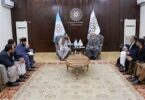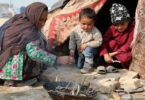Shadi Khan Saif
KABUL: In a warm and open offer for peace to a longtime adversary, Afghanistan’s president on Wednesday called on the Taliban to shun violence and become a political party.
Ashraf Mohammad Ghani outlined the Afghan government’s comprehensive peace strategy towards the Taliban at the Kabul Process international conference attended by representatives of more than 20 countries and international organizations. He said the offer for peace is unconditional. Highlighting the contours of a potential peace deal, Ghani said the Cons-titution will be held supreme, guaranteeing the rights of Afghan citizens, especially women, and no armed group with ties to foreign terrorist organizations will be allowed in Afghanistan.
For confidence-building measures, the president said a cease-fire will be enforced, a political framework will be established, and steps will be taken to free Taliban prisoners as well as lift sanctions imposed on the group.
The president underlined the need to re-integrate the Taliban in the political and economic spheres while stre-ssing the importance of international backing for the course.
“To give assurances to Pakistan in the interests of a stable Afghanistan, state-to-state talks will be initiated, and joint and coordinated efforts to support the proposed talks with the Taliban,” he said in regard to neighboring Pakistan, which is believed to have significant clout with the Taliban.
He also called on Pakistan to hold government-to-government talks, saying: “We will be ready to starts talks with Pakistan and forget the past and start a new chapter.”
Ghani also said the Afghan government will provide passports to Taliban members and their families and will issue visas and open an office for them — even in the capital Kabul — and will also work to lift sanctions from Taliban leaders. On the eve of this significant conference, the Taliban issued a statement, the second of its kind in a month, highlighting their willingness to reach a peaceful settlement via negotiati-ons specifically with the U.S.
It called on American officials “to talk directly” to the Taliban on a peaceful solution to the Afghan quandary. “It would help to find a solution if America accepts the legitimate demands of the Afghan people and forwards its own concerns and requests for discussion … through peaceful channels,” it added.
There has been a sharp rise in violence across Afghanistan since the announcement of a new U.S. war strategy last summer, with militants increasingly targeting the capital Kabul and U.S. and Afghan forces intensifying air and ground offensives against the rebels.
The statement marked a shift from the Taliban’s previous assertion that it would only hold peace talks once foreign troops leave.
At the end, the government issued a four-page declaration on peace and reconciliation; and security cooperation and counter-terrorism.
The declaration was adopted by Australia, Azerbaijan, Canada, China, France, Germany, India, Iran, Italy, Japan, Kazakhstan, Kyrgyz Republic, Korea, Norway, Pakistan, Qatar, Russia, Saudi Arabia, Sweden (Nordic Plus), Tajikistan, Turkey, Turkmenistan, United Kingdom, Uzbekistan, United Arab Emirates, United States, EU, NATO and UN. (AA)






